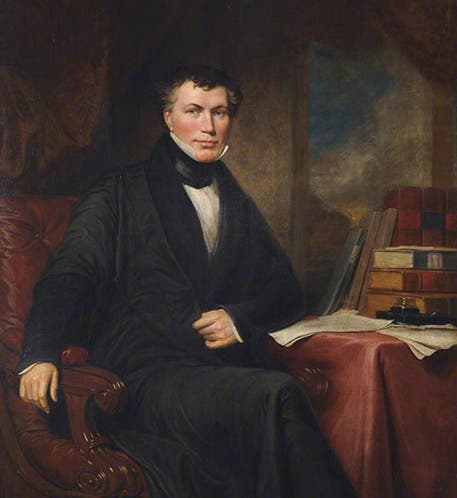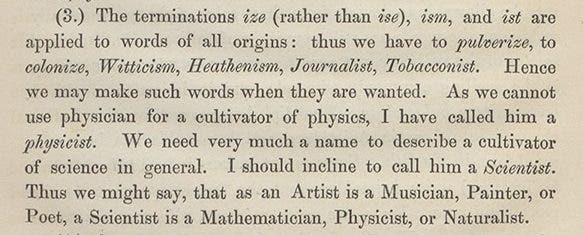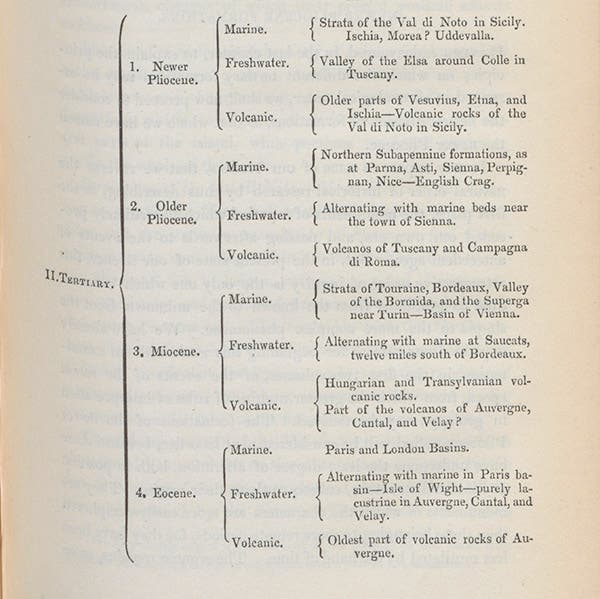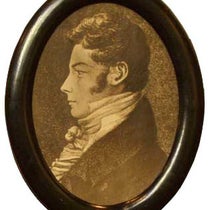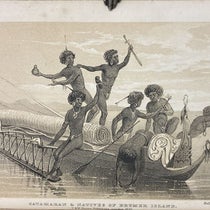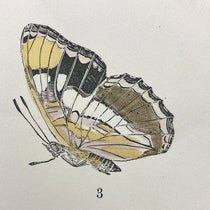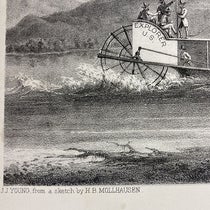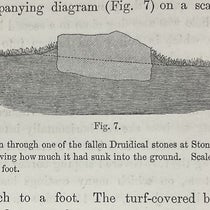Scientist of the Day - William Whewell
William Whewell, an English philosopher of science, was born May 24, 1794. Whewell (pronounced HEW-ell) taught at the University of Cambridge when Charles Darwin was there, and Darwin mentioned in his autobiography that he walked back to his rooms several times with Whewell. Darwin described him as one of the best conversers he ever listened to, but Whewell did not play nearly so strong a role in Darwin's education as did John Herschel and John Henslow. Shortly after Darwin returned from the Beagle voyage, Whewell published A History of the Inductive Sciences (1837) and then, three years later, The Philosophy of the Inductive Sciences (1840); both were of great importance in the revival of Baconian science in Victorian England, and we have all five volumes of the two works in our History of Science Collection. Whewell was best known during his own lifetime for being unusually versatile (he made contributions to mineralogy, geology, meteorology, chemistry, and electro-magnetism), and for being unrelenting in his pursuit of exactness in scientific discourse.
Whewell is often remembered today as a wordsmith. Because of his insistence on accurate scientific terminology, colleagues would seek his aid when trying to coin new words for new discoveries. For example, Whewell coined the words scientist and physicist in 1834 (yes, that means no one ever called Isaac Newton a scientist or a physicist before Whewell, because the words did not exist – Newton was a natural philosopher or an experimental philosopher or a mechanical philosopher, but not yet a scientist). Physicist and scientist first appeared in an anonymous review (written by Whewell) in the Quarterly Review in 1834 (which we do not have in our Library), and then they appeared under Whewell’s own name in the introduction to The Philosophy of the Inductive Sciences (1840). Since we have never seen that page reproduced online, we do so here, showing the appropriate paragraph at the bottom (second image).
Whewell coined many other scientific terms. Michael Faraday, one of the pioneers in electrolysis, sought Whewell's advice in naming the two electrodes used in electrolysis, and Whewell suggested cathode and anode, and further volunteered that an element that receives a charge from a cathode or anode could be called an ion. Charles Lyell was trying to come up with a new geological nomenclature to identify major strata of rocks and major periods of time (typical names for rock strata in those days were "London Clay" or "Old Red Sandstone", and there really were no terms for epochs of time). Whewell recommended dividing the Tertiary period up into three smaller epochs, for which he and Lyell coined the words Pliocene, Miocene, and Eocene, using Greek roots and prefixes to denote the "more recent", "less recent", and “dawn of the recent" periods. Geologists later built on this scheme to come up with similar terms such as Pleistocene and Paleocene. We show part of the page in the third volume of Lyell’s Principles of Geology (1830-33) where these words first appeared.
It is interesting that scientist and physicist had a slow slog to common usage. Many found the word scientist demeaning – Faraday preferred to call himself an experimental philosopher to his dying day, and Thomas Huxley would have nothing to do with either physicist or scientist, opting for the venerable term of natural philosopher. But the Americans took up both terms in the last half of the 19th-century, and eventually the words percolated back across the Atlantic to a still resistant British establishment. Now, of course, they are universal labels.
There are many other terms that Whewell invented, but probably the point has been made. Whewell wasn’t just a wordsmith – he was the most successful wordsmith that science has ever seen. There are many portraits of Whewell available on the web, but most are engravings, and show him as the venerable authority figure he would eventually become. We prefer the oil painting of 1845, property of Trinity College, Cambridge, which portrays Whewell not as venerable, but rather as intelligent and thoughtful, as if he were about to spit out yet another new word, such as catastrophism or biometric.
Dr. William B. Ashworth, Jr., Consultant for the History of Science, Linda Hall Library and Associate Professor, Department of History, University of Missouri-Kansas City. Comments or corrections are welcome; please direct to ashworthw@umkc.edu.

